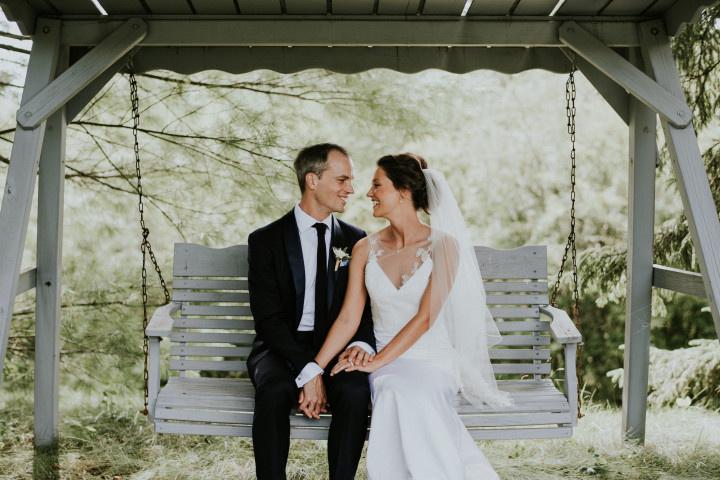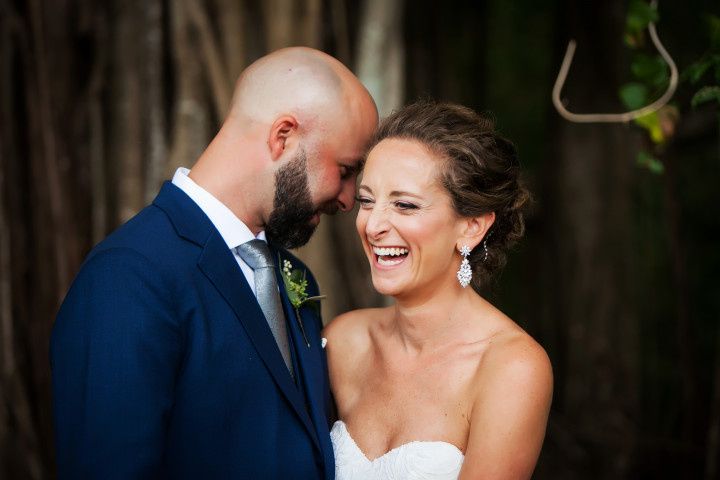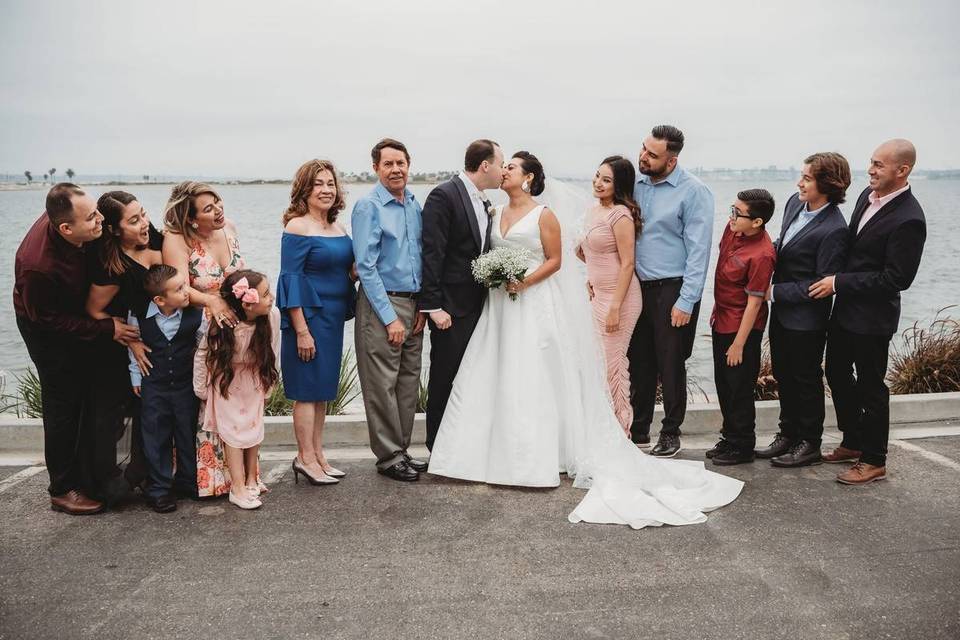6 Tips for Couples Paying for Their Own Weddings
If you and your partner are paying for your own big day, follow these strategic matrimony money management tips.

Insane wedding fact #1,682: Traditionally, when it comes to wedding costs, the bride and her family are supposed to cover…well, pretty much everything. From photos, to flowers, to literally the entire reception and everything that happens during it, not to mention the engagement party, the American way is that the parents of the bride foot the bill. Meanwhile the groom’s parents are required to cover…boutonnieres. And not a ton else. Don’t shoot the messenger—it’s tradition!
Except, this is 2018, and tradition has sort of gone to the wayside since we ditched living with our parents up until our wedding nights and exchanged poofy polyester balloon sleeves for delicate illusion mesh. So if you’re interested in a wedding made up of tossed traditions, it’s highly possible that you and your partner will also be paying for your big day, or at least large portions of it (about 44 percent of couples do), yourselves, a liberating yet daunting proposition that, for me anyway, set in approximately 45 seconds after my engagement ring landed my finger. Even small and simple affairs will likely require checks cut in amounts larger than us non-Kardashians have ever spent on anything in our lives, and the more you start to plan, the more expenses start to appear, as if they are reproducing bacterially. It will be very tempting to freak out immediately, and wish to call the whole thing off.
Do not do that—follow these strategic matrimony money management tips instead.
Get organized.
Before booking anything, sit with your future spouse and start by creating three lists: Must-haves, nice-to-haves, and no-ways. Must-haves are elements you both agree will be worth saving and spending on because they’re important to you (like a great photographer), nice-to-haves are those that you can pick and choose from with whatever money is leftover (like uplighting), and no-ways are elements neither of you think are important enough to prioritize funds over, so you’ll forget about ‘em right out of the gate (like super-fancy favors). Once you’ve settled on your lists (may I suggest you shake on it?), get to work by calling vendors for your must-haves and nice-to-haves and gathering quotes. Formulate a budget based on averages from these quotes and, voila! That’s your savings target.
Get help.
Even if you and your partner are going to be the primary financiers of your wedding, that doesn’t mean you won’t get help here and there—and believe me, a little bit goes a long way to chip away at that total dollar amount! Have lunch with parents and close family members and see who’s willing to help with what—and, if you and your partner are comfortable—opt to trade in a wedding present for help with your wedding costs. Explain that having a delicious meal for your family and friends, or beautiful photos to look back on forever, are worth more to you than any present you could ever ask for (again—trust me here, they’re going to spend the money regardless, so give them a little direction if you’d rather them spend it on helping you with the wedding!). If you find a few takers, try and arrange it so they can cover an entire element (like, the DJ or the catering) rather than simply writing a check. It’ll be a huge load off your and your partner’s shoulders if you can cross an entire vendor’s cost off your list, rather than just throwing some cash into your savings to be used on who-knows-what six months down the line. Of course, if someone simply offers cash—that works too! It would be great to include all family helpers in your ceremony program, or a thank-you speech during the reception.

Get saving.
Now that you’ve got a budget built to your liking and a little bit of help, it’s up to you and your partner to pick up the rest of the tab. Will it be stressful? Unless you’re both oil tycoons, yes, it will be at times—but, honestly? Learning how to work, save and budget together to achieve a shared (expensive) goal is great training for marriage! So, starting with your end target dollar amount (the money you’ll need to pay every vendor, plus tip), work backward and see how much you’ll have to save monthly between now and your wedding to get there. Then, divide those monthly savings goals in half (or make it proportional to your incomes) to establish what each of you should be stowing away each month. You could even set up a direct deposit from your paycheck to your savings, so you don’t have to see the money before it zips into a safe zone (if you’re a shopping addict like me...).
Get saving even more.
Here’s a not-so-glamorous secret from my financial vault: My half of the wedding was paid for almost exclusively by a freelance job I had for a boutique fitness company in the year leading up to my big day. It was a side-hustle I had on top of my day job in advertising, and while it sometimes was definitely too much, I also felt super lucky that I had the opportunity to make extra money during the exact time in my life when I needed it most. Even if you’re not a writer, you can probably find a way to make a little extra wedding money if you think hard enough. From selling the clothes you never wear to a consignment store, to tutoring SATs if you’re brainy like that, to simply digging around for freelance gigs in your field, you can—and should—think beyond your paycheck if you need more cash to pad your savings account. Not to mention, a joint garage sale with your fiancé(e) is a great way to make room in your apartment for all those wedding gifts you’re about to get…
Get tough.
If after everything your target monthly savings amount seems… not quite possible? That’s when you go back to your must-haves/nice-to-haves and make some adjustments. And no, I don’t mean halving your entire guest list or canceling the open bar. You’ll be amazed by how much money you can save with the tiniest tweaks—shrinking your bridesmaids bouquets by 50 percent, for example, or streamlining your tablescapes to cut down on your rental costs. The more you trim off the top of each expenditure, the more you’ll add to your total savings in the long run. Another way to ensure you’re stretching your money as far as it can go is by negotiating with your vendors. More often than not, the original quote you get from a vendor is just a starting point, and you may be able to wiggle their price down. It can feel uncomfortable to negotiate costs at first, since none of us are used to talking that intimately about money with strangers, but remember that this is a part of the job for wedding vendors, and you shouldn’t feel intimidated. Just remember to stay respectful and kind as you negotiate, and do plenty of research. The more you know and the nicer you are, the more leverage you’ll have during negotiations.
Get realistic.
And stay that way. I’m not saying you have to let your budget or financial circumstances bully you, but rather, be clear-headed and realistic with the funds you have and every choice you make, from the date you set (don’t pick a date eight months away from your engagement if you have serious saving to do) to your dress shopping strategy (that old adage about not trying on dresses over your budget? It exists for a reason). If you plan a dream wedding within the budget constraints you have, rather than within the budget you wish you had, you’ll 100 percent be able to achieve your goals. The best part? Thanks to the Internet and its endless stream of inspiration, plus talented wedding vendors, it’s easier than ever to throw a beautiful wedding with just about any budget you’ve got.
Sound like a plan? Good. You should expect a few givens along the way, including moments of victory (“I can’t believe we’re doing this all by ourselves!”) and moments of sheer panic (“What the HELL were we thinking?”), not to mention sudden setbacks (“Wait, we need appetizer plates and dinner plates and salad plates?”) and surprise windfalls (that amazing moment when you’re about to pay a vendor the total amount they quoted you, and remember you already paid half six months ago when you dropped your deposit). All together, the crazy adventure will amount to one kick-ass, 100 percent personal (as in, no one was able to buy themselves any input!), 100 percent you wedding day—something you and your freshly minted spouse can chalk up as the first of many amazing accomplishments you’ll achieve together in your marriage to come. Just don’t forget to put some money aside for your honeymoon—you definitely earned it!





